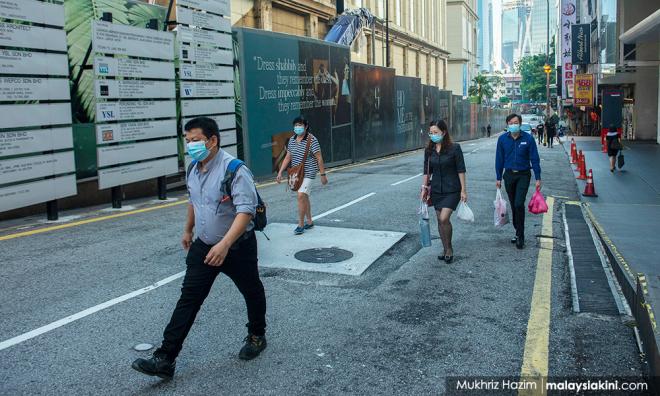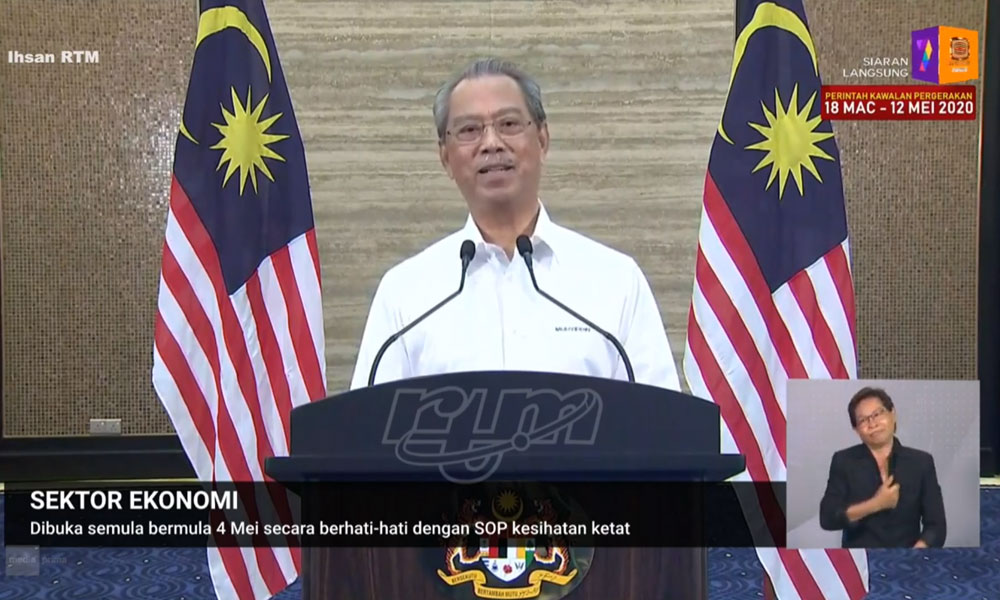
CORONAVIRUS | Economists today cautioned that a rush to implement the conditional movement control order (MCO) could result in bigger losses if the country is hit by another spike in Covid-19 infections.
Six states have announced that it would not follow Putrajaya's lead concerning the conditional MCO beginning today and several economists contacted by Malaysiakini believe that the resistance is justified.
University Malaysia Sarawak senior economics professor Shazali Abu Mansor said it was a reasonable move by the state governments, including Sarawak, to postpone the conditional reopening of certain economic sectors.
"I do think that's reasonable. Even from an economic perspective, it's important for us to also look at the bigger picture.
"If many of us fall sick, that would cause losses to the economy. To reopen and close businesses again, that's a big loss," he said when contacted.
"The economy is not only about making money. We must look at the economy not only from the aspect of dollars and cents," he added.

Prime Minister Muhyiddin Yassin in a special address on May 1 announced that implementation of the conditional MCO would allow certain economic sectors and businesses to restart operations today based on strict Health Ministry Covid-19 prevention guidelines.
It was also previously announced that the MCO, enforced since March 18, will be lifted on May 12.
With only eight days left until May 12, Shazali said states that chose to not proceed with the conditional MCO could use the time to educate the people and employers on compliance to new standard operating procedures.
At the same time, he conceded that even within a state like Sarawak, leeway could be given for people living in the interiors, classified as green zones for Covid-19 infections.
"But not here in Kuching or Kota Samarahan," he said, referring to the two red zones among the 40 districts in Sarawak.
Economist Yeah Kim Leng noted that only time will tell whether the federal government made the right decision to reopen the economy at this juncture after a recent trend of increasing local Covid-19 infections, including one new cluster that involved workers at a construction site.
"Perhaps that (increase in cases) has triggered some states not to rush towards opening the economy.
"Of course there is a loss of economic output, but this is a trade-off that poses less risk," the economics professor at Sunway University told Malaysiakini.
"I think the respective state government is more risk-averse [...] something that could turn out to be less costly, especially without a second outbreak or escalation of infection rates.
"State governments may also want to consider for industries in areas considered to be green (zones) to be allowed to operate," he said.
At the moment, Yeah said different guidelines by different states could pose a challenge and bring added costs for businesses with operations in multiple states.
He, however, noted that the impact could be reduced through various stimulus packages announced by the prime minister throughout the MCO period.
'Direct and indirect losses'
Meanwhile, Yeah said it appeared that the government's current approach was to minimise losses based on Muhyiddin's cited figure of a daily gross domestic product (GDP) loss of RM2.4 billion since March 18, and an estimated total GDP loss of RM100 billion if the MCO is extended for another one month.
"The estimated economic impact can be both in terms of direct loss of income from businesses shut and also an indirect impact from a sharp decline in demand," he said.
Yeah added that these indirect losses would likely exceed the direct impact.
"We can reduce the direct costs to the economy by allowing industries to restart, so long as there are no future costs from the threat of reinfections that could place a burden on our healthcare system," he said.
Even after the MCO has been lifted, economist Barjoyai Bardai said it is unlikely that the daily GDP estimate cited by Muhyiddin - based on an approximate figure of RM1.3 trillion annual GDP - can be reached.
"The economy is only expected to recover at one-third of the normal rate. Why? Because restaurants, for example, they can only seat one third the number of customers, and this goes for other businesses as well," said the senior professor at the Universiti Tun Abdul Razak graduate school of business administration.

With the new guidelines set to be enforced for the long-term, Barjoyai likened the conditional MCO at this juncture to a "ventilator" that could allow "dying businesses" to breathe but was not intended for them to fully recover.
As such he urged businesses to look into new normals for their operations, including automation, cost reduction measures or exploring new opportunities.
Overall, Barjoyai said the states' move to postpone enforcement of conditional MCO would have little impact on the overall economy, although it highlighted relationship issues between the federal and state governments.
Earlier today, Umno vice-president Khaled Nordin ticked off a senior minister in charge of the economy over a purported failure to discuss with state governments before deciding to enforce the conditional MCO.
"The failure shows a clear weakness in the leadership, strategy and coordination in regard to healing the economy," he said in a statement.
Khalid did not name the minister but it is believed he was referring to International Trade and Industry Minister Azmin Ali.
In welcoming the prime minister's announcement, Azmin had said the reopening of the economic sectors would contribute to the gross domestic product growth, domestic and foreign direct investment, better export prospects, and the continuity of the small and medium enterprises (SMEs) as well as job sustainability.
The Miti minister said the government also hoped that with the opening of these economic sectors, the business community - in particular the SMEs which contribute to 66 percent of the country's workforce - would be able to revive their businesses, strengthen cash flow, rebuild the supply chain and address the risk of losing the export market. - Mkini



No comments:
Post a Comment
Note: Only a member of this blog may post a comment.